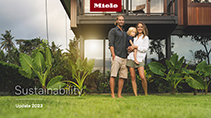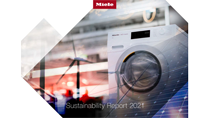Press releases
Miele achieves its own climate target earlier than planned

-
CO2 emissions from energy, heating and transport reduced by more than half
-
New Sustainability Update provides overview of progress made
-
Climate protection will also be a focus for Miele at the forthcoming IFA
Miele was able to reduce its direct and indirect CO2 emissions by 52% in 2022 compared to 2019 - while at the same time increasing its production volume. These and many other key figures are presented by the Gütersloh-based family-owned company in its sustainability update published today. This puts Miele ahead of its self-imposed target of reducing its own emissions (Scope 1) and those for energy deliveries (Scope 2) by 50% by 2030 compared to 2019. Thanks to its particularly energy-efficient appliances, Miele is also ahead of plan with 8.2% savings in the use phase of its products (Scope 3.11).
"Particularly in these very challenging times, we are facing up to our responsibility for climate protection as a family-owned manufacturing company," says Rebecca Steinhage, who as Executive Director of the Miele Group is responsible for Human Resources and Sustainability, among other things. "The fact that we have achieved important climate targets ahead of schedule is a great success, thanks above all to the colleagues who have decisively advanced Miele along this path. At the same time, however, it is also a further incentive to resolutely pursue this course.” The sustainability update now presented documents the success achieved over the past two years.
These include, above all, the reduction of resource consumption and CO2 emissions in production as well as in the products themselves. For example, energy efficiency measures have saved around 10 gigawatt hours of energy per year since 2019, half of which in 2022 alone. In the current year, Miele is investing EUR 16 million in photovoltaic and geothermal projects to generate renewable energy. Sites in China, Germany, the Netherlands and Austria have photovoltaic systems or are building them. By the end of 2023, Miele will thus be generating over 10 gigawatt hours of electricity per year itself. This is roughly equivalent to the annual consumption of 3,000 private households in Germany.
In addition, Miele has begun construction of a geothermal plant at its headquarters in Gütersloh. The aim of the project, for which a total of 175 special boreholes are being drilled, is the renewable generation of heat and cooling for Miele's administrative buildings. This will save the company more than four million kilowatt hours of heat per year from fossil sources - and thus around 600 tonnes of CO2.
The so-called Scope 3 emissions (3.11) are of particular importance at Miele - because a good 83% of a product's CO2 footprint is generated during the use phase. Given the long service life of domestic appliances - only Miele tests its products for up to 20 years - this is therefore where the greatest leverage for sustainability lies. "This is precisely why we want to reduce these CO2 emissions by a total of 15% by 2030 compared to 2019, in actual use across all programmes, not just in the Eco programme," emphasises Rebecca Steinhage. Here, too, Miele is on a very good path and ahead of its targets.
This is due not least to the particularly energy- and water-saving appliances produced by the family-owned company in Gütersloh. The dishwashers in the G 7000 series, for example, are among the most sustainable on the market. The G 7465 SCVi XXL model recently won the prestigious Green Product Award. Miele also supports its customers with assistance programmes or smart features. One example is the Consumption Dashboard in the Miele app, with detailed consumption displays, long-term statistics on usage behaviour, associated consumption and practical tips on how to use the appliance as efficiently as possible.
Less fossil energy also in the supply chain
Purchased goods and services account for 15% of Miele's CO2 emissions. Steel accounts for the largest share of this. Miele has therefore signed declarations of intent with thyssenkrupp Steel Europe AG, Salzgitter AG and H2 Green Steel in order to be able to purchase mostly low-CO2 steel in the future. A pilot project with Salzgitter is already demonstrating how green steel can be successfully installed in ovens. "We are consistently reducing our footprint in procurement even further and, since 2023, have also been using aluminium in ovens whose production is 100% powered by green electricity from hydropower," says Christoph Wendker, Vice President Sustainability and Regulatory Affairs at Miele.
Regenerative coffee cultivation in Brazil
Miele has recently started supporting its own climate protection project and is promoting the establishment of a model farm of around two hectares in Santana da Vargem, Minas Gerais, Brazil. The aim is to support local coffee producers in regenerative cultivation methods and thus improve soil quality, biodiversity and the carbon cycle - and with it the income and quality of life of the local people. Partners in the project are the Brazilian project initiator Flowins and the Amsterdam-based start-up reNature.
In the first step, Miele has invested a high five-digit euro amount, which will be increased several times over after a successful test phase. The farm of the Flowins project group covers an area of 80 hectares, around half of which is coffee plantation. The entire Flowins community in eastern Brazil is much larger, with around 5,900 hectares, 2,800 of which are used for coffee cultivation. In total, more than 5,000 tonnes of green coffee could be produced there, or about 84,000 coffee bags of 60 kilograms each. "Through our commitment in Brazil, we will have to buy fewer offset certificates on the free market in the long term and at the same time support local coffee producers in cultivation methods that improve coffee quality, restore polluted soil and relieve the climate by binding CO2 in the soil," Wendker explains.
Sustainability also in focus at IFA
Innovative products and services for greater sustainability in the home were also the focus of Miele's presence at this year's IFA. Under the motto "A Miele Open House", the Gütersloh-based household appliance manufacturer will be demonstrating in Berlin how the company supports its customers in making their everyday lives as sustainable as possible. Miele is demonstrating this above all with its durable and energy-saving domestic appliances and is presenting, for example, washing machines and fridge-freezers which are each 10% more economical than the best energy efficiency class A. At IFA, Miele will also be showing an update of the Consumption Dashboard with additional functions.
Miele will also be demonstrating potential savings in the home with an interactive information stand in the new Sustainability Village (Hall 2.2). Visitors will learn, for example, how they can easily avoid wasting electricity and water - with positive effects on consumption, the environment and their wallets.
First prototype for the filtration of microplastics
The topic of microplastics in the environment is much discussed and highly complex. Some of it comes from garments and other textiles or from cosmetic residues that enter wastewater through washing. At IFA 2023, Miele presents a first prototype for use on washing machines to filter out microplastics. 'Our objective is to offer a highly user-friendly solution which can be used over the long term and allows both maintenance- and cleaning-friendly operation', stated Dr Markus Miele at the IFA press conference. The new solution therefore achieves a very high level of filtration, is suitable for all wash cycles and is designed throughout to be sustainable so that users enjoy using the filter time and time again. 'We believe that our microplastics filter will be at the vanguard of developments in the marketplace compared with other solutions', says the Executive Director and Co-Proprietor of the Miele Group. The market launch is planned for the end of 2024.
The Sustainability Update 2023 complements the Miele Sustainability Report. Both are available for download at www.miele.com/sustainability.
Company profile: Miele is the world's leading manufacturer of premium domestic appliances including cooking, baking and steam-cooking appliances, refrigeration products, coffee makers, dishwashers and laundry and floor care products. Their product portfolio also includes dishwashers, washing machines and tumble dryers for commercial use as well as washer-disinfectors and sterilisers for use in medical and laboratory applications. Founded in 1899, the company has eight production plants in Germany, one each in Austria, the Czech Republic, China, Romania and Poland as well as two production plants belonging to its Italian medical technology subsidiary Steelco. Sales in the 2022 business year amounted to around € 5.43 bn. Miele is represented with its own sales subsidiaries and via importers in almost 100 countries/regions. Throughout the world, the family-run enterprise, now in its fourth generation, employs a workforce of around 23,300, of which approx. 11,900 employees work in Germany. The company has its headquarters in Gütersloh in Westphalia.
Download as PDF Download incl. media (zip)
Ursula Wilms
+ 49 5241 89-1958
ursula.wilms@miele.com
Media information
| Description | Download |
|---|---|

Photo 1: The Miele Sustainability Update 2023 provides information on past successes through to current projects for greater sustainability. (Photo: Miele) |
|
| High Resolution JPG | |

Photo 2: Just use Eco - Simply use the Eco programme! This is Miele's recommendation with an interactive installation at the IFA. (Photo: Miele) |
|
| High Resolution JPG | |

Photo 3: Rebecca Steinhage, Member of the Miele Executive Board, and Lars-Peter Dierke, Head of the Miele Construction Department, present one of around 2,400 PV modules at the headquarters in Gütersloh. (Photo: Miele) |
|
| High Resolution JPG | |

Photo 4: Miele launches regenerative coffee cultivation project in Brazil. A project employee examines a coffee seedling on the plantation (Photo: reNature) |
|
| High Resolution JPG |


